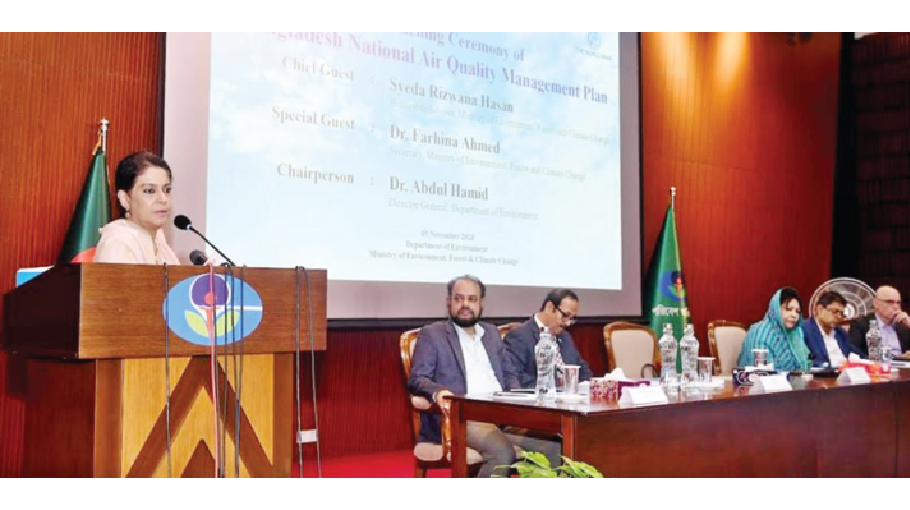National air quality management action plan unveiled
Dhaka’s ‘unhealthy’ air quality continues

Environment, Forest, and Climate Change Adviser Syeda Rizwana Hasan on Tuesday unveiled the national air quality management action plan saying the government developed it for strategic actions to tackle the sources of air pollution, improve air monitoring, and enhancing enforcement mechanisms.
"It provides a roadmap for implementing stringent regulations and promoting cleaner technologies in industries, transportation, and urban development," she said.
The adviser said this while addressing the launching ceremony of 'Bangladesh National Air Quality Management Action Plan' at the Department of Environment (DoE) here.
Rizwana said this action plan is a part of Bangladesh's broader strategy to achieve sustainable environmental targets, with a focus on reducing the alarming levels of pollution that affect both rural and urban areas.
By prioritizing cleaner air, the government reaffirms its commitment to environmental protection and the well-being of future generations, she added.
The adviser said the government agencies, development partners, civil society, and the private sector must work together to ensure effective execution of the plan.
Environment Secretary Dr Farhina Ahmed and World Bank Practice Manager Christian Peter, among others, addressed the event with Director General of the DoE Dr Abdul Hamid in the chair.
World Bank representative, high-level officials from various ministries, environmental organizations, academia, and media representatives were also attended the programme.
Discussions focused on the importance of integrating air quality management into national policies, adopting advanced monitoring technologies, and increasing public awareness about the health impacts of pollution.
On the other hand, Dhaka’s air continues to be unhealthy as it ranked 3rd on the list of cities worldwide with the worst air quality with an AQI score of 164 at 8:59 am on Tuesday.
Pakistan’s Lahore and India’s Delhi occupied the list's first and second spots, with AQI scores of 517 and 412, respectively.
When the AQI value for particle pollution is between 101 and 150, air quality is considered unhealthy for sensitive groups, between 150 and 200 is unhealthy, between 201 and 300 is said to be very unhealthy, while a reading of 301+ is considered hazardous, posing serious health risks to residents.
The AQI, an index for reporting daily air quality, informs people how clean or polluted the air of a certain city is and what associated health effects might be a concern for them.
The AQI in Bangladesh is based on five pollutants: particulate matter (PM10 and PM2.5), NO2, CO, SO2, and ozone.
Dhaka has long been grappling with air pollution issues. Its air quality usually turns unhealthy in winter and improves during the monsoon.
As per the World Health Organization (WHO), air pollution kills an estimated seven million people worldwide every year, mainly due to increased mortality from stroke, heart disease, chronic obstructive pulmonary disease, lung cancer, and acute respiratory infections.




